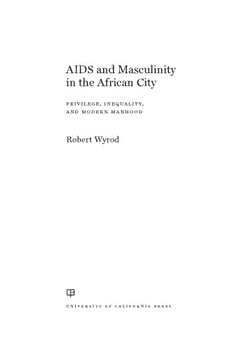
AIDS and masculinity in the African city: privilege, inequality, and modern manhood PDF
Preview AIDS and masculinity in the African city: privilege, inequality, and modern manhood
AIDS and Masculinity in the African City privilege, inequality, and modern manhood Robert Wyrod university of california press AIDS and Masculinity in the African City AIDS and Masculinity in the African City privilege, inequality, and modern manhood Robert Wyrod university of california press University of California Press, one of the most distinguished university presses in the United States, enriches lives around the world by advancing scholarship in the humanities, social sciences, and natural sciences. Its activities are supported by the UC Press Foundation and by philanthropic contributions from individuals and institutions. For more information, visit www.ucpress.edu. University of California Press Oakland, California © 2016 by The Regents of the University of California All photographs are by the author. Library of Congress Cataloging-in-Publication Data Names: Wyrod, Robert, author. Title: aids and masculinity in the African city : privilege, inequality, and modern manhood / Robert Wyrod. Description: Oakland, California : University of California Press, [2016] | Includes bibliographical references and index. Identifi ers: lccn 2015047468 (print) | lccn 2015047889 (ebook) | isbn 9780520286689 (cloth : alk. paper) | isbn 9780520286696 (pbk. : alk. paper) | isbn 9780520961784 (ebook) Subjects: lcsh: aids (Disease)—Social aspects—Uganda. | Masculinity—Uganda. Classifi cation: lcc ra643.86.u33 .w97 2016 (print) | lcc ra643.86. u33 (ebook) | ddc 362.19697/920096761—dc23 LC record available at http://lccn.loc.gov/2015047468 Manufactured in the United States of America 25 24 23 22 21 20 19 18 17 16 10 9 8 7 6 5 4 3 2 1 In keeping with a commitment to support environmentally responsible and sustainable printing practices, UC Press has printed this book on Natures Natural, a fi ber that contains 30% post-consumer waste and meets the minimum requirements of ansi/niso z39.48–1992 (r 1997) (Permanence of Paper). Contents List of Figures and Tables vii 1. Remaking Masculinity in Bwaise 1 2. The Making of Masculinity in Urban Uganda 43 3. Providing in Poverty 80 4. Women’s Rights in the Remaking of Masculinity 123 5. The Intersection of Masculinity, Sexuality, and AIDS 160 6. Beyond Bwaise 205 Epilogue 233 Acknowledgments 241 Appendix 245 Notes 249 References 259 Index 283 Figures and Tables figures 1.1. Kampala’s central business district. 7 1.2. Bwaise’s main commercial strip. 9 1.3. HIV prevalence in Uganda by year, gender, age, and region of country. 14 1.4. Masculinity as a social process. 29 1.5. Kampala, Kawempe Division, and Bwaise. 32 1.6. Housing in Bwaise. 33 1.7. Business in Bwaise. 34 2.1. Main ethnic groups in Uganda. 45 3.1. Kimombasa section of Bwaise during the day. 96 3.2. Exterior of a lodge in Bwaise. 100 3.3. A typical carpentry workshop in Bwaise. 104 3.4. Author during carpentry apprenticeship. 106 4.1. A young couple in Bwaise. 129 4.2. A family outside their home in Bwaise. 133 vii viii figures and tables 5.1. Bwaise’s main intersection. 171 5.2. Bwaise during the rainy season. 175 5.3. A group of women in Bwaise. 187 E.1. Bwaise’s main intersection in 2015. 235 tables A.1. Demographic Characteristics of Interviewees, 2004 246 A.2. Demographic Characteristics of Participants in Couples Research, 2009 247 Remaking Masculinity in Bwaise 1 Crammed into the back of a stuff y matatu, one of Kampala’s ubiquitous white minivan buses, I strained to see my stop. I was making my fi rst visit to Bwaise, a densely populated slum community that became the focus of my fi eldwork in Uganda. Our matatu had begun its journey in Kampala’s city center, near the offi ce towers, government buildings, and large hotels that were the pulsing core of this vibrant capital city. In twenty minutes, after many jarring stops to disgorge and ingest passengers, we had passed the main university campus, a nearby slum with mushrooming student hostels, a long stretch of carpentry workshops displaying overstuff ed couches, and a Pentecostal megachurch that resembled an airplane hangar. I knew I was now close to my destination, and when I spotted Bwaise’s main landmark, a three-story furniture showroom, I shouted, “Siteegi!” (Bus stop!), and clambered out of the matatu. I had come to Bwaise to visit the home of Christine, a forty-four-year- old widow who had lived in Bwaise for over two decades. Christine and I met a week earlier at a nearby health clinic when I attended a support group for HIV-positive people. Christine was the treasurer of the Post-Test Club, and she had passionately channeled her own experience living with HIV into educating and counseling residents of Bwaise about AIDS. 1
